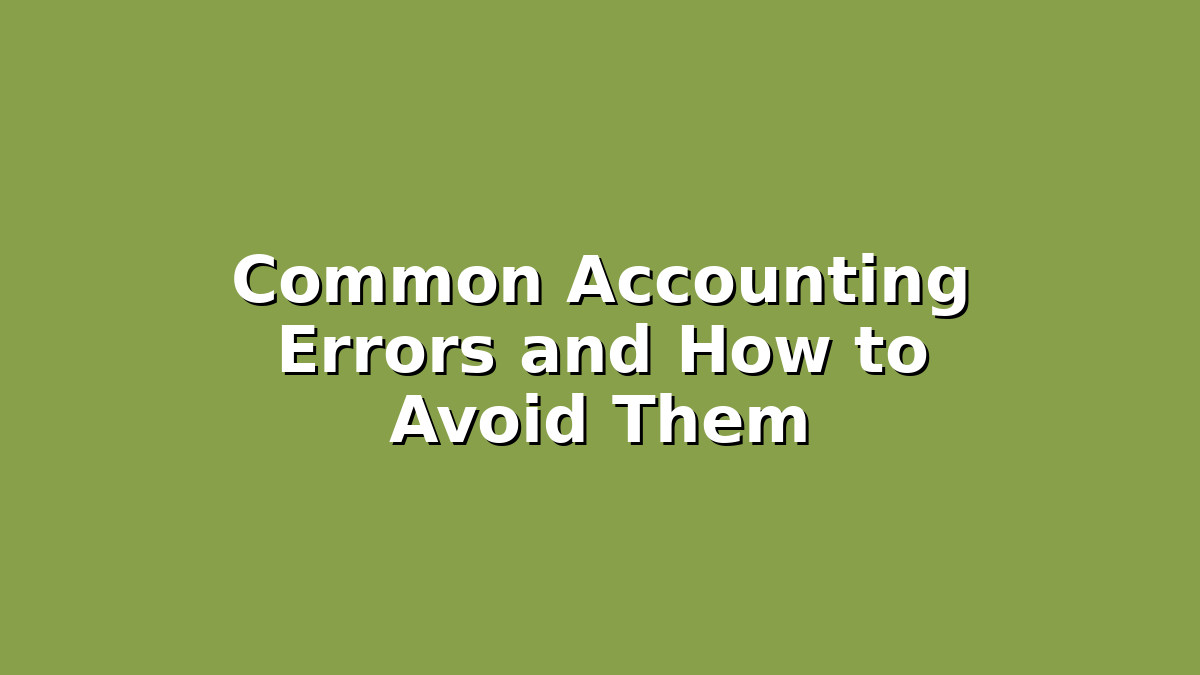Accounting can be a challenging subject, especially for students preparing for exams or trying to master its principles for the first time. Whether you’re studying for a final exam or simply looking to improve your understanding, one of the most important skills you can develop is the ability to identify and avoid common accounting errors. These errors not only impact your grades but can also undermine your confidence and make the subject seem more difficult than it really is. In this article, we’ll explore some of the most frequent accounting mistakes students make and offer practical, study-related advice to help you avoid them. With focused preparation and the right approach, you can improve your accuracy, boost your exam performance, and even enjoy the process of learning accounting.
1. Misunderstanding Basic Accounting Principles
One of the biggest reasons students make errors in accounting is a shaky grasp of foundational concepts. Accounting relies heavily on principles such as the double-entry system, the matching principle, accrual accounting, and the accounting equation (Assets = Liabilities + Equity). Without a clear understanding of these, it’s easy to make mistakes like recording transactions incorrectly or mixing up debit and credit entries.
How to Avoid This:
– Master the Basics Before Moving On: Spend extra time reviewing core concepts before tackling complex problems. Use flashcards or summary notes to memorize key definitions and principles.
– Practice Consistently: Work through simple journal entries and ledger postings daily. Repetition helps reinforce how and why each transaction affects accounts.
– Relate Theory to Real-Life Examples: Try to connect accounting concepts to everyday situations, such as budgeting your expenses or understanding bank statements. This contextual learning can solidify your grasp.
– Ask for Clarification: If you don’t understand a principle, seek help immediately—whether from teachers, classmates, or online forums. Don’t let confusion build up.
By building a strong foundation, you’ll reduce the chances of fundamental mistakes during exams and assignments.
2. Errors in Recording and Posting Transactions
Once you understand the principles, accurate recording of transactions is the next critical step. Common errors include transposing numbers (e.g., writing 54 instead of 45), misclassifying accounts, or failing to record a transaction entirely. These mistakes can cascade, causing trial balances not to balance and financial statements to be incorrect.
How to Avoid This:
– Double-Check Your Work: After posting transactions, always go back and verify your entries. Check that debits equal credits and that amounts are entered correctly.
– Use a Systematic Approach: Adopt a consistent method for recording transactions. For example, always write journal entries in the same format and order to minimize confusion.
– Practice with Sample Problems: The more you practice, the more familiar you’ll become with common transaction types and the typical accounts involved.
– Develop a Checklist: Before finalizing an assignment or exam question, run through a mental or written checklist:
– Have I recorded all transactions?
– Are the amounts correct and consistent?
– Have I posted to the correct ledger accounts?
– Do my debits equal my credits?
By treating your work like a process to be followed carefully, you’re less likely to overlook errors.
3. Poor Time Management and Exam Strategy
Even when you know your stuff, exam pressure can lead to careless mistakes like rushing through calculations, misreading questions, or skipping steps. Time management and exam strategy are crucial to minimize such errors and maximize your performance.
How to Avoid This:
– Practice Under Exam Conditions: Simulate timed conditions when doing practice tests. This helps you pace yourself and get used to answering questions accurately within a limited time.
– Read Questions Carefully: Take a moment to understand what each question is asking before jumping in. Highlight key terms and amounts.
– Allocate Time Wisely: Don’t spend too long on one question. Move on if you get stuck and come back later if time permits.
– Show Your Work Clearly: Even if you’re unsure of the final answer, showing your working steps can earn you partial credit and helps avoid arithmetic errors.
– Review Your Answers: Reserve 5–10 minutes at the end to go over your calculations and entries. This is your chance to catch any obvious slips.
Good exam habits can be just as important as content knowledge when it comes to avoiding errors and achieving high scores.
—
Conclusion
Accounting may seem intimidating, but many common errors that students make are avoidable with the right approach. By grounding yourself in the fundamental principles, carefully recording and reviewing transactions, and practicing effective exam strategies, you can greatly reduce mistakes and improve your confidence. Remember that mistakes are part of the learning process—each one is an opportunity to understand the material better and sharpen your skills. Keep practicing regularly, seek help when needed, and maintain a positive mindset. With persistence and focus, you’ll be well on your way to mastering accounting and succeeding in your exams.

Responses